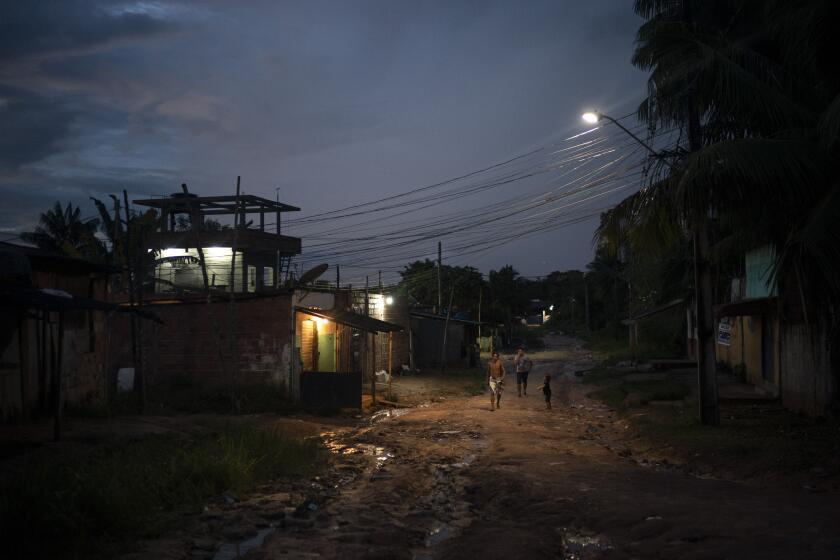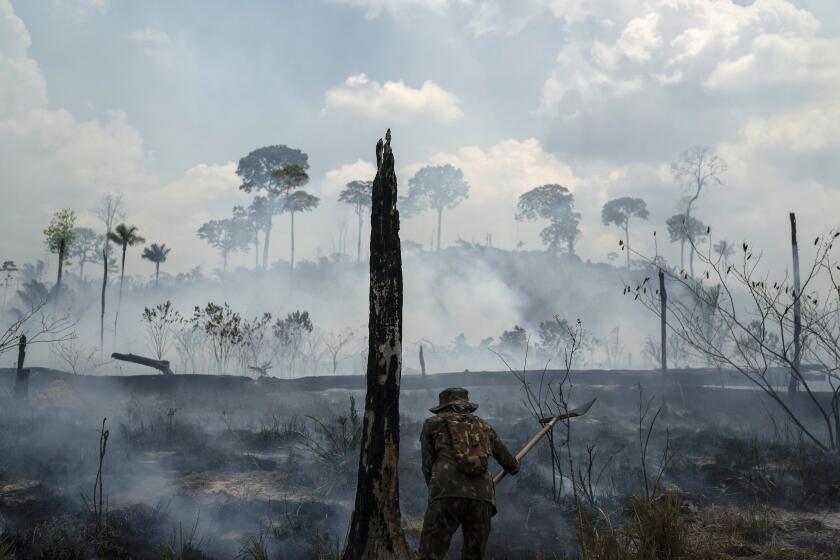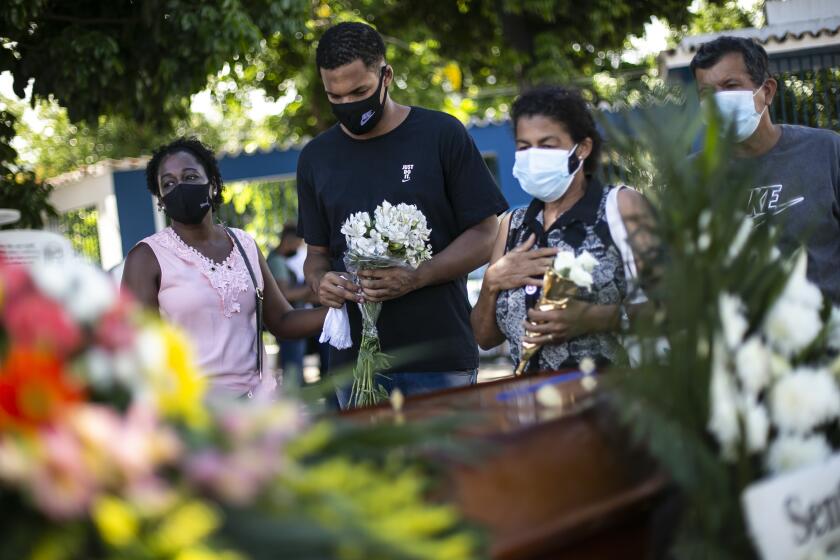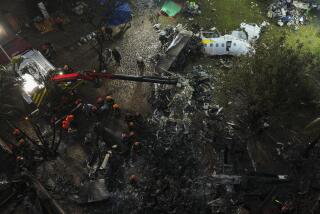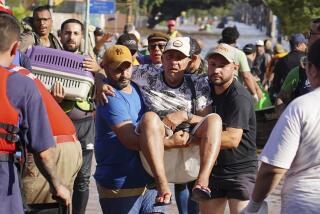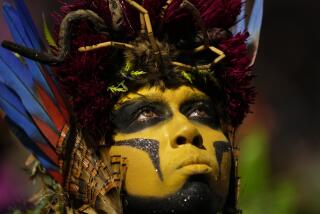Deep in the ‘Earth’s lungs,’ Amazonian city scrambles to get oxygen to COVID-19 patients
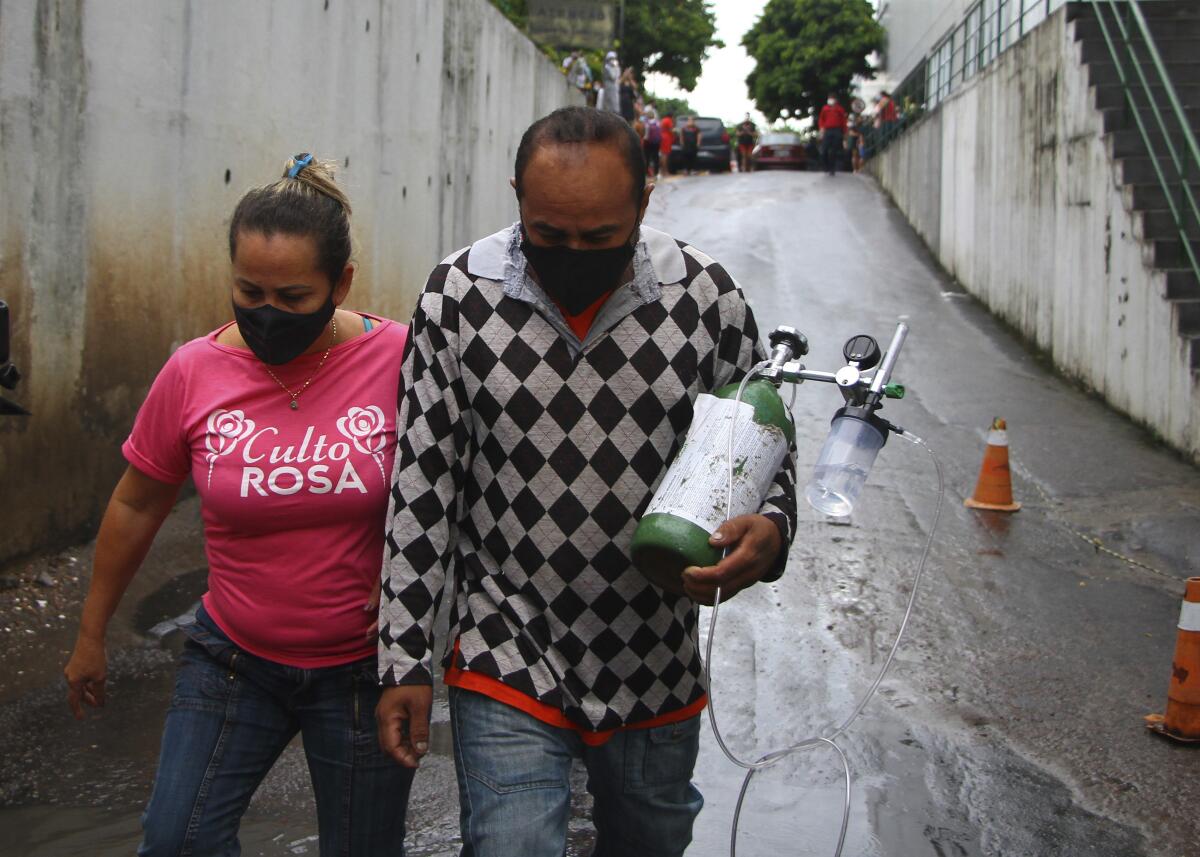
- Share via
SAO PAULO, Brazil — Hospital staff and relatives of COVID-19 patients rushed to provide facilities with oxygen tanks flown into the Amazon rainforest’s biggest city as doctors were forced to choose which patients would breathe.
The scramble came amid dwindling oxygen supplies in the Brazilian city of Manaus and an effort to airlift some hospital patients to other states.
As heavy rain poured down Thursday, Rafael Pereira carried a small oxygen tank for his mother-in-law at the 28 de Agosto hospital. He didn’t want to be interviewed because of his stress, but he looked relieved when the tank — which he said would aid her breathing for an additional two hours — was taken inside.
Health workers at the Hospital Universitario Getulio Vargas took empty cylinders to the hospital’s oxygen supplier in hopes there would be some new ones to bring back. Usually, the provider picks up the cylinders and delivers newly refilled ones.
Despairing patients in overloaded hospitals waited as oxygen arrived to save some but came too late for others. At least one of the cemeteries of Manaus, a city of 2.2 million people, had mourners lining up to enter and bury their dead. Brazilian artists, soccer clubs and politicians used their platforms to cry for help.
Brazil’s air force said in a statement late Thursday that it had dispatched two planes with 18 tons of oxygen cylinders from Sao Paulo — South America’s biggest city — with more planned to follow. The local government’s oxygen provider, multinational company White Martins, said in a statement that it was considering diverting some of its supply from neighboring Venezuela. It wasn’t immediately clear whether this would be sufficient to address the spiraling crisis.
The coronavirus is spreading upriver from the Amazonian city of Manaus, in Brazil, into indigenous reserves.
“Yes, there is a collapse in the healthcare system in Manaus. The line for beds is growing by a lot — we have 480 people waiting now,” Brazilian Health Minister Eduardo Pazuello said in a Thursday night broadcast on social media. “We are starting to remove patients with less serious [conditions] to reduce the impact.”
Hospitals in Manaus admitted few new COVID-19 patients Thursday, suggesting that many will suffer from the disease at home, and some may die.
“My grandmother died today because of lack of oxygen,” Mayline da Mata, 30, told the Associated Press outside one Manaus hospital. “My grandmother, 84 years old, couldn’t survive. She needed 15 liters, and there wasn’t enough.”
The strain prompted the government of Amazonas state to say it would transport 235 patients who depend on oxygen but aren’t in intensive care to five other states and the national capital, Brasilia.
“I want to thank those governors who are giving us their hand in a human gesture,” Amazonas Gov. Wilson Lima said at a news conference.
“All of the world looks at us when there is a problem as the Earth’s lungs,” he said, alluding to a common description of the Amazon rainforest. “Now we are asking for help. Our people need this oxygen.”
Massive fires in the Amazon rainforest triggered an international outcry last year and Brazil promised to halt them, but this year looks as bad.
Governors and mayors throughout the country offered help amid a flood of social media videos in which distraught relatives of COVID-19 patients in Manaus begged for people to buy them oxygen.
Federal prosecutors in the city asked a local judge to pressure President Jair Bolsonaro’s administration to step up its support. The prosecutors said that the main air force plane in the region for oxygen-supply transportation “needs repair, which brought a halt to the emergency influx.”
The air force said in a separate statement Thursday night that it was deploying two planes to transport patients along with medical teams starting Friday.
The U.S Embassy in Brasilia also confirmed that it had received a request from the federal government to support the initiative, without providing details.
Local authorities recently called on the federal government to reinforce Manaus’ stock of oxygen. The city’s 14-day death toll is approaching the peak of last year’s first wave of the COVID-19 pandemic, according to official data.
The governor has decreed more coronavirus restrictions, including the suspension of public transportation and a curfew between 7 p.m. and 6 a.m.
Brazilians are once again crowding their beaches and the country is marking a pandemic milestone, second only to the U.S. in COVID-related deaths.
The new measures were challenged by protesters who carried Brazilian flags through the streets Thursday. The governor, once seen as an ally of Bolsonaro, has faced criticism from supporters of the conservative president for imposing new restrictions aimed at stemming the coronavirus’ recent surge.
Bolsonaro has downplayed risks of the disease, saying the economic fallout of the pandemic would kill more people than the coronavirus. His son Eduardo, a lawmaker who chairs the international relations committee in Brazil’s lower house, was one of the many conservatives who egged on supporters in December to challenge social distancing and disobey stay-at-home orders.
Park of the Tribes, a community of more than 2,500 Indigenous people on the outskirts of Manaus, went more than two months without any resident showing COVID-19 symptoms. In the past week, 29 people have tested positive for the coronavirus, said Vanda Ortega, a volunteer nurse in the community. Two went to urgent care units, but no one yet has required hospitalization.
“We’re really very worried,” said Ortega, who belongs to the Witoto ethnicity. “It’s chaos here in Manaus. There isn’t oxygen for anyone.”
More to Read
Sign up for Essential California
The most important California stories and recommendations in your inbox every morning.
You may occasionally receive promotional content from the Los Angeles Times.
